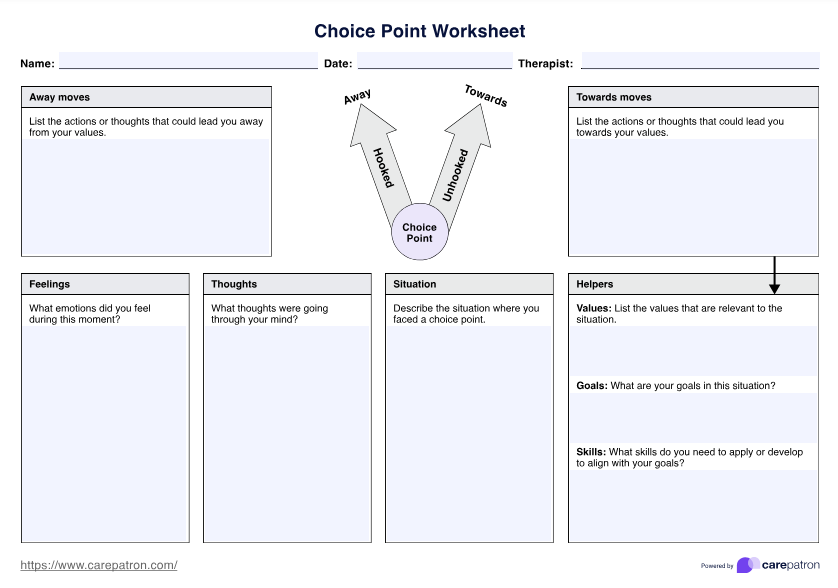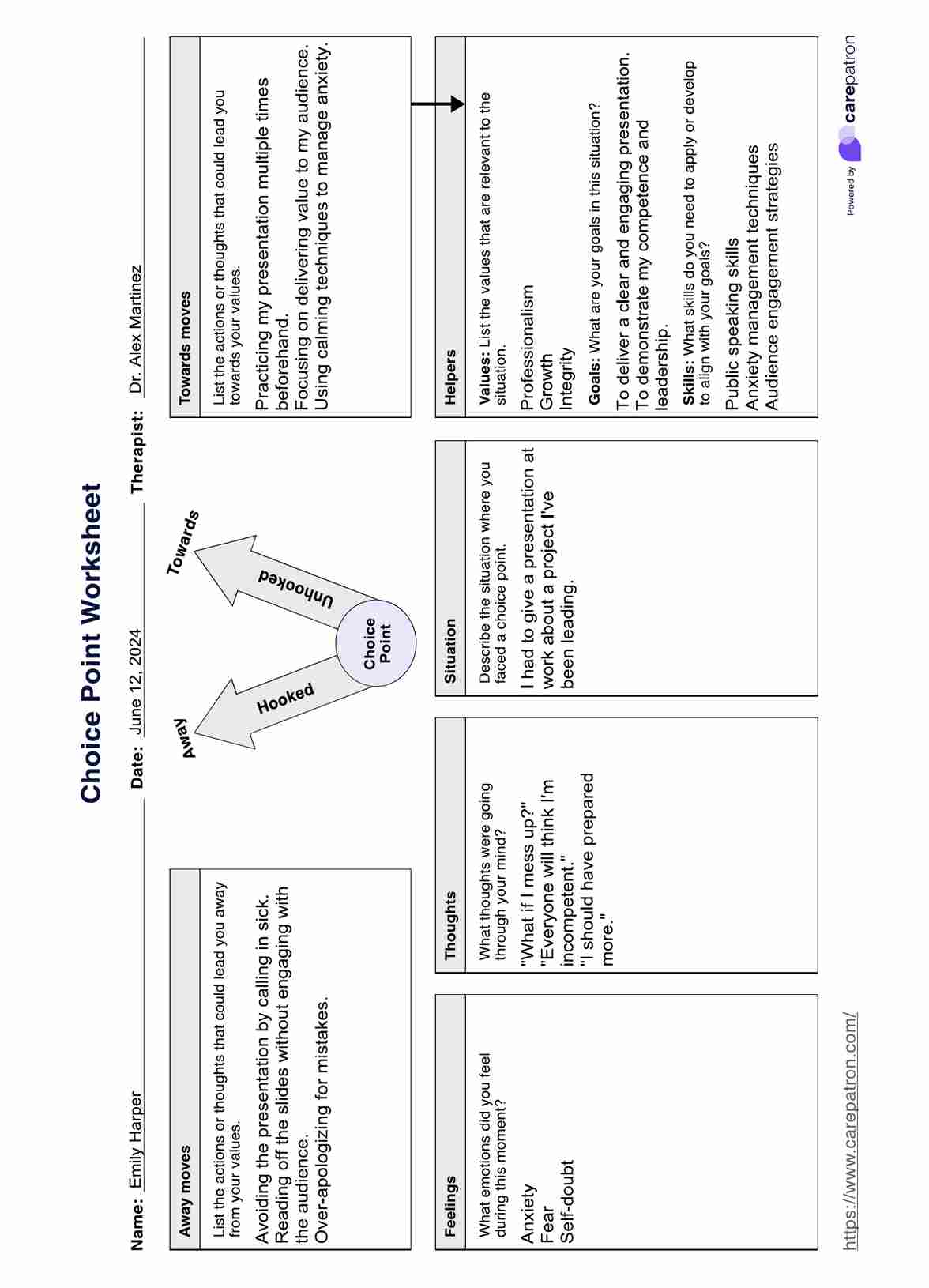Choice Point Worksheet
Download our free Choice Point Worksheet to streamline therapy sessions, enhance decision-making, and align actions with values. It's perfect for commitment therapy.


What is acceptance and commitment therapy (ACT)?
Acceptance and Commitment Therapy (ACT) is a form of psychotherapy that emphasizes accepting what is out of control while committing to action that enriches one person's life. ACT aims to increase psychological flexibility by using mindfulness strategies, clarifying values, and changing behavior to align with those values.
Choice Point Worksheet Template
Choice Point Worksheet Example
What is the Choice Point Worksheet?
The Choice Point Worksheet is a tool used in ACT to help individuals make conscious decisions that align with their values, particularly in challenging situations. It aids in visualizing different courses of action and their potential outcomes, encouraging choices toward valued living.
What is the goal of the worksheet?
The Choice Point Worksheet aims to facilitate awareness of decision-making processes and encourage more deliberate choices aligned with the person's values. This awareness helps individuals push past mental walls and change their behavior.
What is the theory behind the ACT Choice Point Worksheet?
The theory and psychology behind the ACT Choice Point Worksheet are rooted in the broader principles of ACT, which integrate mindfulness and values-based action. The worksheet helps individuals distinguish between "away moves"—actions that move away from values—and "towards moves"—actions that align with and support personal values.
Understanding the Choice Point Worksheet
To further enhance understanding of the Choice Point Worksheet in the context of ACT, it's helpful to explore the components and methods of the worksheet more deeply:
- Awareness: This section is designed to help the person understand the decision-making moment. It encourages reflection on the immediate thoughts and emotions that arise at the point of choice, which is crucial for individuals dealing with issues like substance use disorder, where spontaneous decisions can have significant consequences.
- Values clarification: The worksheet asks the person to identify and articulate what values are important to them in the decision context. This step is vital as it shifts the focus from immediate gratification to more long-term, value-driven goals, supporting a behavior change that aligns with personal growth and recovery.
- Committed action: The final component involves planning and committing to actions that resonate with the identified values. This section helps translate thought and awareness into practical steps that can be taken to move toward a valued direction in life. It’s about making choices that feel good at the moment and contribute to a fulfilling and meaningful life.
These components are structured to facilitate a change in perspective from a reactive stance to a more reflective and proactive approach. This shift is particularly beneficial in treatment settings, where individuals are working to overcome patterns of behavior that are inconsistent with desired life outcomes. Thus, the Choice Point Worksheet is a powerful tool in therapy, promoting greater self-awareness and compassion, a clearer understanding of personal and family values, and commitment to behavior change.
How does our Choice Point Worksheet work?
Our Choice Point Worksheet offers a structured approach that guides individuals through mapping their reactions to different scenarios. This template helps users visually outline each decision point, allowing for a clearer analysis of potential actions and their outcomes.
The worksheet assists users in choosing actions that align with their core values by systematically evaluating their decisions' short-term and long-term consequences. This structured visualization helps individuals see the benefits and drawbacks of each choice, promoting more adaptive, aware, and values-aligned responses in various life situations.
Benefits of answering the Choice Point Worksheet
The free Choice Point Worksheet is an invaluable tool that aids individuals in navigating decision-making processes more effectively. Engaging with this worksheet offers several benefits, such as:
Enhancing self-awareness
Utilizing the Choice Point Worksheet significantly enhances self-awareness among individuals. It encourages them to actively engage and recognize the decision points they encounter daily and be mindful of the thoughts and feelings that arise in these moments. This heightened awareness is crucial for identifying behavioral patterns and understanding the emotional triggers and feelings that may lead to less optimal decisions.
Promoting deliberate decision-making
The worksheet aids readers in fostering a more deliberate approach to decision-making. By clarifying personal values and assessing how well potential choices align with them, individuals can make decisions that are reactive to immediate circumstances and reflect their long-term goals and personal ideals. This process ensures that decisions are made thoughtfully, considering the broader impact of their choices.
Supporting long-term behavior change
Answering the Choice Point Worksheet supports long-term behavior change by reducing impulsive emotional reactions. It provides a structured framework for individuals to reflect on the consequences of their emotions, words, and actions, both in the short and long term. By consistently applying the principles outlined in the worksheet, users can develop habits and responses more aligned with their values, leading to enduring changes in behavior that benefit their overall life trajectory.
Commonly asked questions
A choice point is a moment where an individual recognizes they have the power and freedom to choose between actions that align with their values and those that do not. Explaining choice points involves discussing the potential consequences of different actions and determining how these align with one's deeper goals and values.
The Choice Point model provides a framework to push past mental walls and overcome barriers to behavioral change. It encourages individuals, especially those dealing with substance use disorders or other emotional challenges, to make conscious decisions that align with their values and long-term goals. This model not only aids in treatment but also empowers persons to take consistent action toward recovery and resilience.
Absolutely. The Choice Point Worksheet is an excellent tool in commitment therapy, particularly useful for individuals grappling with anxiety or substance use disorders. Using this worksheet, patients can identify decision points in their daily lives where they can choose between old and new behaviors aligned with their recovery goals. This process is crucial for changing behavior and reinforcing the treatment's effectiveness.

.jpg)























-template.jpg)













































































